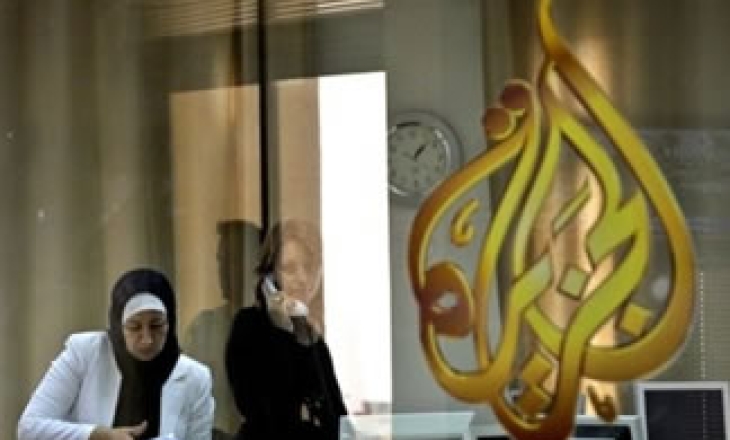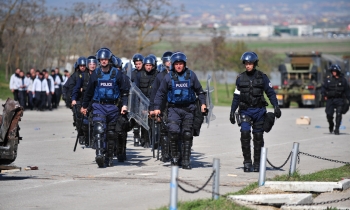Palestinian authorities on Sunday allowed Al-Jazeera to resume operations in the West Bank, four days after banning the Arab satellite station over the airing of a claim linking President Mahmoud Abbas to the death of his legendary predecessor, Yasser Arafat, the Associated Press (AP) reported.
Correspondent Walid al-Omari said he received a phone call from Prime Minister Salaam Fayyad informing him of the decision, and the station's staff resumed covering the news in the West Bank on Sunday morning. But Al-Omari said Fayyad told him his government would still press ahead with a lawsuit against the Qatar-based station for alleged incitement.
Some background details: [Link]
Last week, an Al-Jazeera talk show hosted an exiled official in Abbas' Fatah movement who alleged the Palestinian leader played a role in the death of Arafat in 2004.
The official, Farouk Kaddoumi, a longtime rival of Abbas, did not present evidence. The incident exacerbated existing tensions between the station and Abbas' Palestinian government, which has long complained that Al-Jazeera sides with its political rivals, the Islamic militants of Hamas.
On Wednesday, the day of the decision, Al-Jazeera employees were seen frantically piling files into black garbage bags and carrying them out with video cameras, computers and other equipment before Palestinian security officials closed the office. Al-Jazeera's Qatar headquarters issued a statement saying the station "has maintained strict, professional journalistic standards."
The Palestinian Authority initially planned on suspending the station's operations while the lawsuit was pending, government official Jamal Zakout said Sunday, but then decided against it, "so it would not be understood that there would be tightening of freedoms because that was not the goal."
In shutting Al-Jazeera down, Abbas risked picking a fight with one of the most potent shapers of Arab public opinion. For Al-Jazeera, the Arab world's most popular news station, the brief closure represented only the latest clash with a Middle Eastern government. Iraq has expelled it and Saudi Arabia only let it resume work recently after a long ban. Israel has often clashed with the station, but allows it to operate freely.
The 75-year-old Arafat fell violently ill in October 2004 at his West Bank compound. He was transferred to a French hospital where he died several weeks later. Palestinian leaders have never given a definitive cause of death, and many Palestinians accused Israel of poisoning Arafat. Israel denies the allegations.
The International Federation of Journalists (IFJ) welcomed the decision of the Palestinian Authority to revoke its order of July 15. "This is a step in the right direction and we welcome it," said Aidan White, IFJ General Secretary. "But, the Authority must drop the lawsuit, as well, as a mark of their commitment to press freedom."
IFJ last week warned that recourse to courts will only lead to intimidation of media and called on the Palestinian Authority to find alternatives ways to challenge comments it criticised Al-Jazeera for. "It is disappointing that the Government maintains its lawsuit, "added White. "No alternative seems to have been considered for addressing its grievances. This flies in the face of its stated concern for public freedoms, journalistic and media work."
The Palestinian Center for Development and Media Freedoms (MADA) welcomed the decision and demanded that the Palestinian Authority drop the lawsuit as it would lead to increased concerns among journalists and media outlets, besides enhance self-censorship.
The Jerusalem Post had some other info: [Link]
The PA's decision to rescind the closure was not unexpected. A source close to Fayad told The Jerusalem Post that the decision to ban Al-Jazeera was originally taken by Abbas and some of his close aides. "Mr. Fayad was opposed to this step from the beginning," the source said. "He said that such a move would be counterproductive and cause more damage."
The source added that Abbas was so furious with Al-Jazeera for airing Kaddoumi's charges that he had initially instructed the PA government not only to shut the station's office, but to arrest all its correspondents in the West Bank, including bureau chief Walid al-Omari.
"Again, the prime minister [Fayad] was strongly opposed to the decision to arrest the Al-Jazeera reporters," the source revealed. "The director of Fayad's press office, Ghassan Khatib, was also opposed to the closure of the station's bureau."
The closure of the Al-Jazeera office drew sharp criticism from many Palestinians, who accused the PA of harassing and intimidating journalists.
Tensions between the PA and Al-Jazeera have been mounting ever since senior PA officials accused the popular satellite station of serving as a platform for Hamas. Abbas has long been under pressure by many of his aides to ban Al-Jazeera from operating in PA-controlled areas in the West Bank under the pretext that it "incites" against the PA leadership in Ramallah.










